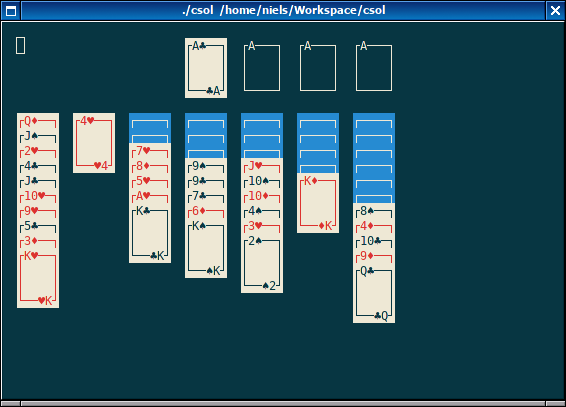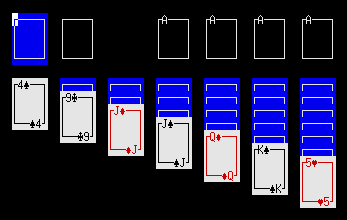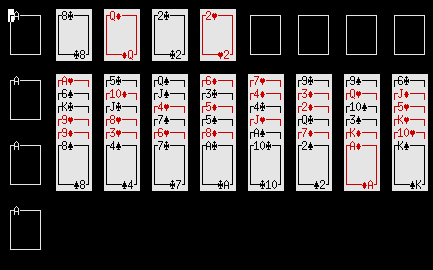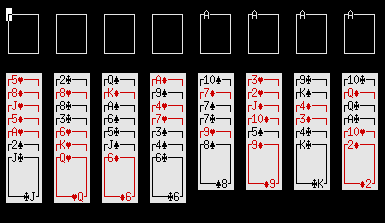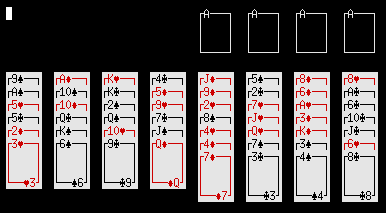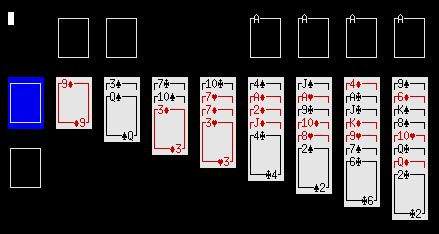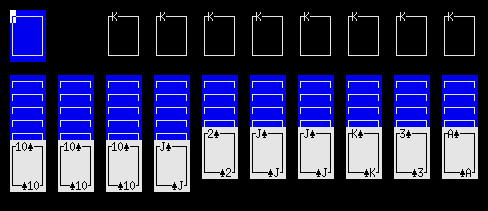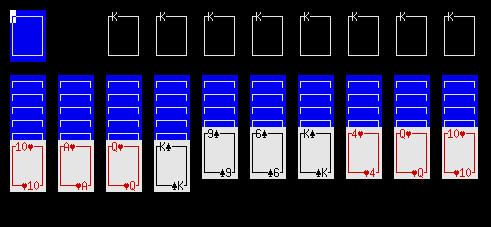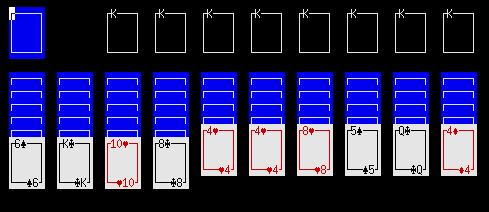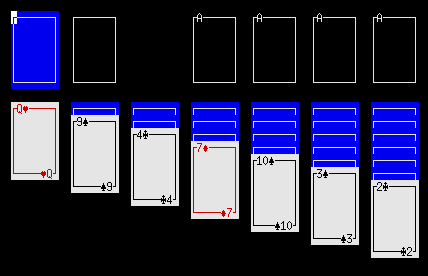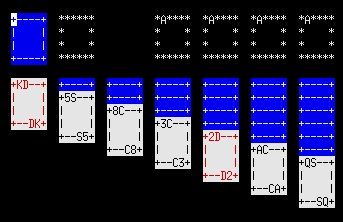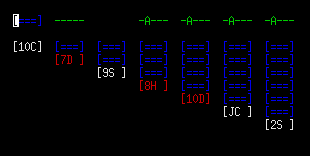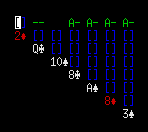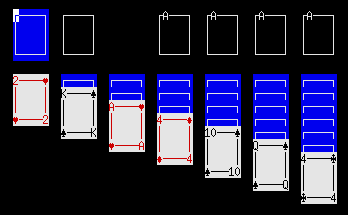| doc | ||
| dos | ||
| games | ||
| images | ||
| src | ||
| themes | ||
| win | ||
| .gitignore | ||
| CHANGES.md | ||
| CMakeLists.txt | ||
| csol.png | ||
| csolrc | ||
| LICENSE | ||
| README.md | ||
csol
A small collection of solitaire games implemented in C using ncurses.
Usage
Compile and run:
cmake .
make
./csol
Games
Klondike (default): csol klondike
Yukon: csol yukon
Eight Off: csol eightoff
Freecell: csol freecell
Russian Solitaire: csol russian
Yukon Freecell: csol yukonfc
Klondike Freecell: csol klondikefc
Spider 1 Suit: csol spider1
Spider 2 Suits: csol spider2
Spider 4 Suits: csol spider4
Golf: csol golf
Themes
csol -t default
csol -t default-xl
csol -t ascii
csol -t compact
csol -t compact-ascii
csol -t ultracompact
csol -t corners
Options
--version/-v: Show version--help/-h: Show help--list/-l: List games--themes/-T: List themes--theme <name>/-t <name>: Use a theme--mono/-m: Disable colors--seed <seed>/-s <seed>: Seed the prng--config <file>/-c <file>: Use a configuration file--colors/-C: List colors available in the current terminal--scores/-S: Show stats for all games.--scores <game>/-S <game>: Show history of all scores in a game.
Keys
Move the cursor using H, J, K, and L or the arrow keys.
Move the cursor to the leftmost position using Shift+H or Shift+←.
Move the cursor to the rightmost position using Shift+L or Shift+→.
Move the cursor to the bottom of the current pile using Shift+J or Shift+↓.
Move the cursor to the top of the current pile using Shift+K or Shift+↑.
Select the card under the cursor using Space.
Move the selected card to the tableau or foundaton under the cursor using M or Enter.
If the card under the cursor is already selected, pressing Space again will move the card to a foundation or a free cell if possible.
Press A to automatically move a card (from any tableau or cell) to a foundation if possible.
Press S to move a card from the stock to the waste or redeal if stock is empty.
Press W to move a card from the waste to the pile under the cursor.
Press 1 – 9 to move a card from a cell to the tableau or foundation under cursor.
Press U or Ctrl+Z to undo one or more moves.
Press Shift+U, Ctrl+Y, or Ctrl+R to redo.
Press Ctrl+S to toggle smart cursor.
Press Ctrl+V to toggle vertical stabilization for smart cursor.
Press Esc to clear the current selection.
Press Ctrl+L to redraw the screen.
Press R to play a new game.
Press Q to quit.
Mouse
In terminals with mouse support it's possible to select cards using the left mouse button (same as SPACE) and to move cards using the right mouse button (same as M).
Configuration
The system-wide configuration file is /etc/xdg/csol/csolrc with games in /etc/xdg/csol/games and themes in /etc/xdg/csol/themes.
csol will use $XDG_CONFIG_HOME/csol/csolrc or $HOME/.config/csol/csolrc instead if one of them exists. The include-command can be used to include the system-wide-configuration file. An example of a simple configuration file:
include /etc/xdg/csol/csolrc
default_game yukon
default_theme default-xl
scores 1
stats 1
scores_file scores.csv
stats_file stats.csv
smart_cursor 0
keep_vertical_position 0
alt_cursor 0
The theme_dir and game_dir commands can be used to lazily load theme and game configuration files from a directory.
The scores command enables or disables the use of CSV file to record all scores. scores_file can be used to set the file path of the scores file.
The stats command enables or disables the use of CSV file to keep track of total game time and the best scores for each game. stats_file can be used to set the file path of the stats file.
On Linux the default location for scores.csv and stats.csv is either $XDG_DATA_HOME/csol/ or $HOME/.local/share/csol/. On DOS and Windows the default location is the same directory as csol.exe.
The smart_cursor command toggles an alternative cursor movement scheme that always places the cursor on a card. keep_vertical_position is used in conjunction with the smart cursor, if it's set to 1, then the cursor won't move vertically when moving left and right.
alt_cursor switches between two styles of cursor:
alt_cursor 0 uses the normal block cursor. Depending on the terminal and color scheme it may be hard to spot:
alt_cursor 1 uses the new default cursor:
Themes
Themes are defined with the theme-command:
theme {
name test
title "Test theme"
heart ♥
spade ♠
diamond ♦
club ♣
width 6
height 4
x_spacing 2
y_spacing 1
x_margin 2
y_margin 1
color my_green 0 500 0
bg my_green
fg black
empty {
top ┌────┐
middle │ │
bottom └────┘
fg white
bg my_green
}
back {
top ┌────┐
middle │ │
bottom └────┘
fg white
bg blue
}
red {
top ┌────┐
middle │ │
bottom └────┘
fg red
bg white
}
black {
top ┌────┐
middle │ │
bottom └────┘
fg black
bg white
}
}
heart/spade/diamond/club are used to set the symbols used for the different suits.
width/height are used to set the size of a card.
x_spacing/y_spacing are used to set the horizontal/vertical spacing between cards.
x_margin sets the distance between the left side of the terminal and the first card.
y_margin sets the distance between the top of the terminal and the first card.
rank followed by a number between 1 and 13 and a symbol redefines the symbol used for a rank.
utf8 can be set to 0 if the theme doesn't use UTF8 encoding.
empty/back/red/black are used to set the characters used to draw cells and the back and front of cards.
text-blocks can be placed inside layout-blocks (empty, back etc.) to add text:
text {
format suit_rank
x -1
y -1
align left
}
format is one of suit_rank, rank_suit, rank, suit, or none (default).
If x is negative, the x-position will be calculated as width + x.
If y is negative, the y-position will be calculated as height + x.
align right can be used to right align the printed text such that the right-most character is printed on x.
Colors
fg and bg are used to set the foreground and background colors used to draw the background and cards.
The two commands expect a color index or a color name. The colors assigned to each index depends on the terminal and color scheme of the terminal, but often the values 0–7 are assigned to black, red, green, yellow, blue, magenta, cyan and white and the values 8–15 are assigned to brighter versions of those colors.
The following named default colors are available: default, black, blue, green, cyan, red, magenta, yellow, white, bright_black, bright_blue, bright_green, bright_cyan, bright_red, bright_magenta, bright_yellow, and bright_white.
In some terminals it is also possible to redefine colors using the color-command. This command takes 4 arguments. The first arguments is either the index of a color to redefine or a name, the following three arguments are the red/green/blue values for the color in the range 0–1000.
Games
Games are defined using the game-command:
game {
name klondike
title Klondike
repeat 4 {
foundation {
x 3+
first_rank a
next_suit same
next_rank up
}
}
repeat 7 {
tableau {
y 1
x 0+
deal 1+
hide -1
first_rank k
next_suit diff_color
next_rank down
move_group group
}
}
stock {
deal 52
}
waste {
x 1
from stock
}
}
The command decks specified how many decks of cards are used in the game (default is 1).
The command deck_suits specifies which suits are used in a deck. The suits are identified by a letter, e.g. deck_suits hs matches hearts and spades.
There are four types of rule-blocks that can be used inside a game-block: foundation, tableau, stock, and waste.
The repeat command can be used to repeat a game rule. Inside a repeat-block it's possible to use expressions of the form INIT+INCREMENT where INIT is the value used for the first iteration. Before each additional iteration INCREMENT (optional, 1 by default) is added to the value.
The following example creates three cells with the (x, y) values (0, 2), (1, 4), and (2, 6):
repeat 3 {
cell {
x 0+
y 2+2
}
}
Game rules
The following command can be used in a rule block:
x: horizontal position of the pile (default: 0).y: vertical position of the pile (default: 0).deal: number of cards to initially deal to the pile,restcan be used to deal remaining cards from deck (default: 0).redeal: maximum number of redeals (forstock-pile). -1 for unlimited (default -1).hide: number of cards to initially deal face-down. If the number is negative, i.e.hide -n, then all cards are hidden except the top n cards (default 0).first_rank: rank of first card in pile (see below for possible values) (default:aceif foundation,noneif stock,anyotherwise).first_suit: suit of first card in pile (see below for possible values) (default:sameif foundation,noneif stock,anyotherwise).next_rank: rank of next card in pile (see below for possible values) (default:upif foundation,downif tableau,noneif stock or cell,anyotherwise).next_suit: suit of next card in pile (see below for possible values) (default:sameif foundation,anyif tableau,noneif stock or cell,anyotherwise).move_group: whether it's possible to move a valid sequence (group), a complete sequence (all), any sequence (any), or just single cards (one, default).from: which pile type to accept cards from:foundation,cell,tableau,stock,waste,any, ornone(default:stockif waste,anyotherwise).to: which pile type to move stock cards to (default:wasteif stock,anyotherwise.win_rank: the game is won when the top card of all foundations is of this rank (see below for possible values) (default:kingif foundation,noneotherwise).class: an integer. Can be used to group together several game rules (default: 0).turn: an integer. How many cards to turn from stock. (default: 1 if stock, 0 otherwise).same_class: a rule block that applies only when the class of the source and destination is the same.valid_group: a rule block that applies when moving sequences of cards.
The following values can be used with commands that expect a rank:
any: any ranknone: no cards allowedempty: empty pile expected (e.g.win_rank empty)a/2/3/4/5/6/7/8/9/10/j/q/k: exact ranksame: must be the same rank as the card belowdown: must be exactly one rank lower than the card belowup: must be exactly one rank higher than the card belowup_down: must be exactly one rank higher or lower than the card belowlower: must be lower rank than the card belowhigher: must be higher rank than the card below
The follwing values can be used with commands that expect a suit:
any: any suitnone: no cards allowedheart/diamond/spade/club: exact suitred/black: exact colorsame: must be the same suit as the card belowsame_color: must be the same color as the card belowdiff: must be a different suit than the card belowdiff_color: must be a different color than the card below
